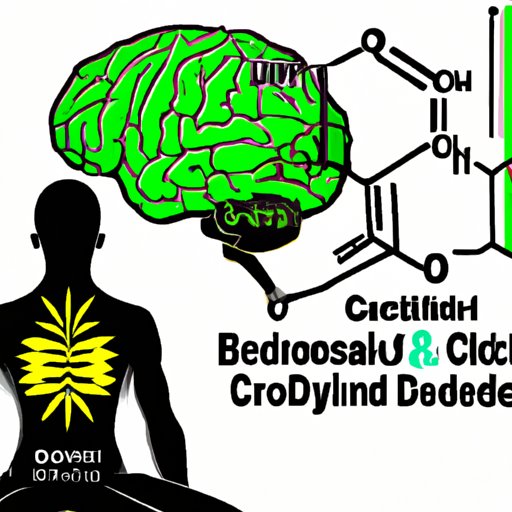I. Introduction
CBD, or cannabidiol, is a natural compound found in the cannabis plant. Unlike THC, another active compound found in cannabis, CBD does not produce psychoactive effects. In recent years, CBD has gained popularity for its potential health benefits, including reducing inflammation, relieving pain, and managing anxiety and depression.
As CBD becomes more widely used, concerns have been raised about its potential impact on liver health. In this article, we’ll explore the latest research on CBD and liver function, debunk common misconceptions, and provide tips for using CBD safely.
II. A Comprehensive Guide to Understanding the Effects of CBD on Your Liver
A. What is the liver and what does it do?
The liver is a vital organ in the body responsible for filtering and processing toxins, hormones, and other substances. It produces bile, which helps with digestion, and plays a role in regulating metabolism and blood sugar levels.
B. How does CBD affect the liver?
Research on the impact of CBD on liver function is still relatively new, but some studies suggest that high doses of CBD can lead to liver damage in mice. However, it’s important to note that these studies used extremely high doses of CBD, much higher than what humans would typically consume.
Additionally, recent research has found that low doses of CBD may actually have a protective effect on the liver. The key is to use CBD in moderation and to work closely with a healthcare provider to monitor liver function.
C. Factors that can impact the effect of CBD on the liver
There are several factors that can impact how CBD affects the liver, including the dose, frequency of use, and method of consumption. Additionally, individual factors such as age, weight, and overall liver health can also play a role in how CBD interacts with the liver.

III. Breaking Down the Latest Research on CBD and Its Impact on Liver Function
A. Recent studies on the link between CBD and liver health
One study published in the journal Molecules found that low doses of CBD had a protective effect on the liver in mice. Another study published in the journal Drug Metabolism and Disposition found that CBD can impact the levels of certain liver enzymes, which could affect drug metabolism.
B. Findings and their significance
While there is still much research to be done on the impact of CBD on liver health, the available studies suggest that CBD may have both potential benefits and risks. Lower doses of CBD may be protective for the liver, while higher doses could potentially lead to liver damage.
C. Criticisms and limitations of the research
One limitation of the current research on CBD and liver function is that many studies have been done in animals, not humans. Additionally, the doses used in these studies are often much higher than what humans would typically consume.
IV. The Pros and Cons of CBD: What You Need to Know About Its Potential Effects on Liver Health
A. Benefits of CBD
CBD has been shown to have a variety of potential health benefits, including reducing inflammation, managing pain, and improving mental health. Additionally, some research suggests that low doses of CBD may be protective for the liver.
B. Potential risks to liver health
While research on the impact of CBD on liver function is still in its early stages, studies have suggested that high doses of CBD could lead to liver damage in mice. It’s important to use caution when consuming CBD and to work closely with a healthcare provider to monitor liver function.
C. The importance of using CBD safely
Just like any supplement or medication, it’s important to use CBD safely. This means using it in moderation, working closely with a healthcare provider, and being aware of potential side effects and risks.

V. CBD and Liver Enzymes: Exploring the Link Between CBD Use and Liver Function
A. What are liver enzymes and how are they affected by CBD?
Liver enzymes are proteins that help the liver break down toxins and other substances. Research has found that CBD can impact the levels of certain liver enzymes, which could affect how the liver metabolizes drugs.
B. Understanding the role of liver enzymes in liver function
Because liver enzymes play a key role in the liver’s ability to process toxins and other substances, changes in their levels can impact overall liver function.
C. Impact of CBD on liver enzyme levels
Some studies have found that CBD can increase the levels of certain liver enzymes, while others have found that it can decrease them. More research is needed to fully understand how CBD affects liver enzyme levels and how this impacts overall liver function.
VI. Should You Be Concerned About CBD and Your Liver? Debunking Common Misconceptions
A. Common misconceptions about CBD and liver health
There are many misconceptions about the impact of CBD on liver health, including the belief that CBD is always harmful to the liver. However, research suggests that low doses of CBD may actually be protective for the liver.
B. The truth behind these misconceptions
While high doses of CBD may be harmful to the liver, the potential benefits of low doses suggest that it can be used safely with careful monitoring. Additionally, using other medications or supplements alongside CBD could increase the risk of liver damage.
C. Accurate information on CBD and liver health
The best way to learn about the potential impact of CBD on your liver health is to work closely with a healthcare provider. They can help you monitor your liver function and provide personalized recommendations based on your individual health needs.
VII. How CBD Interacts with Your Liver: The Science Behind Its Potential Benefits and Risks
A. The endocannabinoid system and liver function
The endocannabinoid system is a complex network of receptors and neurotransmitters that plays a role in regulating many bodily functions, including liver function. CBD interacts with this system, potentially impacting liver function in both positive and negative ways.
B. The effects of CBD on liver metabolism and inflammation
Research has found that CBD can impact liver metabolism and inflammation, potentially improving overall liver function. However, more research is needed to fully understand the complex effects of CBD on the liver.
C. Scientific evidence on the potential benefits and risks of CBD for liver health
The scientific evidence on CBD and liver health is still evolving, but there is growing evidence that low doses of CBD may have a protective effect on the liver. However, high doses of CBD could potentially be harmful, and more research is needed to understand the full range of potential benefits and risks.

VIII. The Safe Use of CBD for Liver Health: Tips and Precautions You Need to Consider
A. Dosage recommendations
The optimal dosage of CBD for liver health is still being studied, but it’s important to start with a low dose and gradually increase as needed. Working with a healthcare provider can help you find a safe and effective dose.
B. Ways to minimize the risk of liver damage
To minimize the risk of liver damage, it’s important to use CBD in moderation and to avoid using other medications or supplements that could interact with CBD. Additionally, getting regular check-ups and monitoring liver function can help detect any potential issues early on.
C. Conclusion: Best practices for using CBD safely
CBD can be a beneficial supplement for liver health when used safely and with caution. By working closely with a healthcare provider, monitoring your liver function, and using CBD in moderation, you can enjoy the potential benefits of this natural compound while minimizing your risk of liver damage.
IX. Conclusion
A. Recap of important points
While the impact of CBD on liver health is still being studied, the available research suggests that low doses of CBD may be protective for the liver, while high doses could potentially be harmful. It’s important to use CBD in moderation and to work closely with a healthcare provider to monitor liver function.
B. Final thoughts on CBD and liver health
While there is still much to learn about the impact of CBD on liver health, the growing body of research suggests that it could potentially be a helpful supplement for those looking to support liver function. Working with a healthcare provider to determine safe dosages and monitor liver function is key.
C. Call to action: Encouraging readers to use CBD safely and get regular check-ups to monitor their liver health.
If you’re interested in using CBD to support liver health, it’s important to use it safely and with caution. Work closely with a healthcare provider to determine safe dosages and monitor liver function through regular check-ups.
